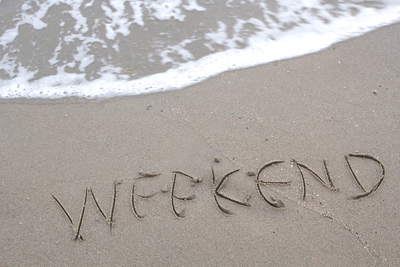 I began this long weekend with a bit of apprehension — on the one hand looking forward to having an extra day to get my work done, and on the other hand knowing that I don’t really have an extra day — I’m just spacing out my workload differently. A long weekend for me is not really a chance to have an extra day of relaxation and enjoyment. It’s an extra day to get things done that have been placed on hold. The sheer magnitude of everything I had on my long weekend agenda was quite overwhelming. I decided to try to keep up as intense a pace as possible in hope of getting it all done.
I began this long weekend with a bit of apprehension — on the one hand looking forward to having an extra day to get my work done, and on the other hand knowing that I don’t really have an extra day — I’m just spacing out my workload differently. A long weekend for me is not really a chance to have an extra day of relaxation and enjoyment. It’s an extra day to get things done that have been placed on hold. The sheer magnitude of everything I had on my long weekend agenda was quite overwhelming. I decided to try to keep up as intense a pace as possible in hope of getting it all done.
Before the weekend even began, however, something happened that made me stop and reflect, something that brought me to tears and made me wonder about why our society has become so frenzied, so harried, so rushed. Early Friday morning, there was a horrific bus crash just north of Edmonton. Initially four men were killed, but over the next few days, two more men succumbed to injuries received in the crash. The men were workers coming home from Fort McMurray to Edmonton, likely looking forward to spending a long weekend away from the job with their families.
Having lived in Edmonton and been around the oil industry all my life, I know many people who work in Fort McMurray, an oilsands boomtown about a five-hour drive north of Edmonton. I’ve traveled there, performed there several times in my band, and members of my family have worked for the oil companies up there at times. It easily could have been one of them on that bus.
Thousands of workers travel that route each week, commuting to work at the huge Syncrude and Suncor plants. Fort McMurray is suffering boomtown overcrowding, with living space at a premium. It is common for workers to live in work camps for shifts of a week or more, returning home on weekends by bus or car. This particular bus, one of many on the highway that morning, was carrying 43 contract workers from the Syncrude Oilsands Expansion Project. The bus had left Fort McMurray late the previous evening, with workers eager to arrive home as early as possible to eke out every precious hour of the long weekend.
At about 12:45 a.m. on Friday morning, a little less than an hour from home, the bus encountered a roadblock near Gibbons. Police had closed the highway due to a vehicle rollover accident earlier, and in spite of the lateness of the hour, traffic was heavy. A long line-up of cars and buses waited for the Royal Canadian Mounted Police (RCMP) to clear the road, and several had already turned back, hoping to find a faster alternate route to Edmonton. Reports say that workers on the bus, like most workers heading home for the weekend, often urged the bus driver to push on as quickly as possible. This occasion was no different, and frustrated at the delay, workers apparently pressured the driver to follow the lead of other buses, turn around and find another route. In the process of backing up the bus on the two-lane highway, the rear wheels became stuck in the soft shoulders of the deep ditch flanking the road, leaving the bus stranded and almost completely blocking both lanes across the highway.
Most of the workers got off the bus, and many stood behind the bus, on the passenger side, chatting and smoking. Some reportedly were attempting to help push the bus’s rear wheels out of the ditch. An RCMP vehicle had been redirecting oncoming traffic in front of the blocked bus, but left for some reason. Suddenly the headlights of a tractor-trailer semi-truck came barrelling down the highway, and those still on the bus realized in horror that the semi was not slowing down. Moments later the truck slammed into the side of the bus. The force of the collision sent the bus spinning, rolling over top of those standing behind the bus, throwing passengers and luggage through the windows. Four men were killed almost instantly, 25 men were injured. Two men died on the following day succumbing to their injuries.
During the next few days, investigators and first-hand eyewitness reports began to unravel the complete story of what happened. In seeking answers, many attempts have been made to identify a place to lay blame. Some say the trucker should have seen the bus. Others say the bus didn’t have appropriate flares and reflective triangles set out, even though it was completely lit up and should have been visible in the night sky. Some criticize the driver for having made a bad decision to turn around on the narrow highway. Others defend the driver, stating that several other buses had already successfully turned back. Some say the driver was simply responding to pressure from the passengers, who were extremely eager to get home. One veteran bus operator has verified this, saying that workers coming home from the oilsands on their time-off are notorious for putting “a lot of pressure on a driver in order to increase your speed, not get passed, to pass other vehicles ahead of you” (D’Aliesio and O’Donnell, May 23, 2005). This operator claims that intense pressure and harassment often gets drivers to the point where “you do something you wouldn’t normally do” (Ibid.). There have also been some who fault the RCMP for leaving their post instead of continuing to warn oncoming drivers about the bus. Many are pointing to the accident as powerful evidence of the need to improve the condition of this busy commuter highway.
In between all the questions and finger pointing, however, only one thing remains certain. The accident occurred because the bus was trying to turn around. Whether this was due to pressure from the passengers or another motivating factor — the bus was trying to turn around in an attempt to save time, to avoid having to wait on the highway, to get driver and passengers home as soon as possible. Ironically, this effort to save time has meant a loss of time forever for at least six men in the prime of their lives. In a rush to get a long weekend started, they will never again enjoy a long weekend; never again have time with their loved ones.
Every long weekend we hear news announcers make the same warning, asking drivers to take it slow, to take it easy on the commute home, so they will arrive safely. But every long weekend is marred by accidents like this one, not always on such a large scale, but tragic nonetheless. It’s not confined to rushed long weekend driving either. People who are in a hurry cause accidents in many other ways too. I don’t know how many times I’ve dropped something heavy, slammed a finger, bruised myself, or otherwise caused an injury simply because I was in a hurry. All my rushing then becomes a complete waste. By the time I’ve had to stop and deal with the damage I’ve inadvertently done to others or myself no time has been saved!
We have such an obsession with saving time. We’re consumed with trying to maximize every moment we have, filling our lives with activities and rushing from one to another. Most of us are locked into a job, driven by financial need or a desire to have a certain quality of life to put in long hours through the week. We live for the weekend (or our days off, in the case of shift workers) and then we rush home to spend whatever little time is left with our family or on some enjoyable personal activity. There is always a sense of being rushed, of never having enough time to do the things we really want to do. Yet rushing never seems to buy us any extra time. Time is a precious commodity, one we never have sufficient quantities of.
I gave this a lot of thought over the long weekend. Thinking about the workers who had been hurrying home to spend time with their family, who will never again have time, I tried to really appreciate how I utilize my own time. I took the time to be with my family and I tried to spend a little time just for myself. Once again I made an effort to push away the guilty feelings regarding awaiting deadlines (not an easy task!) and tried to keep a healthy perspective. Of all our possessions, time is the most valuable, yet it is so easily lost.
Sed fugit interea, fugit inreparabile tempus
But meanwhile it is flying, irretrievable time is flying
– Virgil, The Georgics III, l. 284
References
Cormier, R. and Farrell, J.(2005, May 21). Oilsands workers die in bus horror:Trucker didn’t see bus in time. Edmonton Journal. Rtd May 22/05: http://www.canada.com/edmonton/edmontonjournal/news/story.html?id=e4405c01-303a-476e-b488-5455de6a48d1
D’Aliesio, R. & O’Donnell, S.(2005, May 23). Police left just before fatal crash – witnesses. Edmonton Journal. Rtd May 22/05: http://www.canada.com/edmonton/edmontonjournal/news/story.html?id=487479a9-ab3a-4e07-9509-610cf0486b68
Knowles, E., ed. (2003). “Virgil.” The Concise Oxford Dictionary of Quotations. Oxford Reference Online. Retrieved May 24/05: http://0-www.oxfordreference.com.aupac.lib.athabascau.ca:80/views/ENTRY.html?subview=Main&entry=t91.e2463


